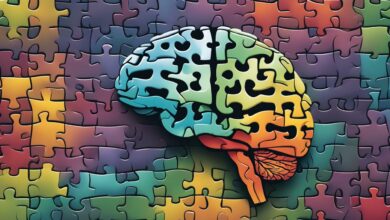Prioritizing Mental Health in Your Healthcare Routine

Maintaining good physical health is essential, but it should not be at the expense of your mental health. Your mental well-being is just as important and should be given the same level of attention. Incorporating mental health into your healthcare routine is crucial for achieving overall well-being.
We understand that mental health is often stigmatized and neglected, but it is time to break the taboo and prioritize it. By taking care of your mental health, you will be able to manage stress and improve your overall quality of life. Let us explore the significance of mental health in your healthcare routine.
Key Takeaways:
- Mental health is just as important as physical health in achieving overall well-being.
- Prioritizing mental health in your healthcare routine can help manage stress and improve your quality of life.
Understanding the Connection Between Mental and Physical Health
In today’s fast-paced world, mental health is often overlooked in favor of physical health. While keeping our bodies healthy is important, neglecting our mental well-being can have serious consequences on our overall health. We need to understand the connection between our mental and physical health and take steps to address both.
Research has shown that poor mental health can lead to physical health problems such as cardiovascular disease, immune system dysfunction, and chronic pain. On the other hand, taking care of our mental health can have positive effects on our physical health, such as lowering blood pressure, improving sleep, and reducing inflammation.
Stress is a perfect example of how our mental and physical health are connected. When we experience stress, our bodies release hormones that trigger the “fight or flight” response. This response can be helpful in short bursts, but chronic stress can lead to physical health problems such as headaches, digestive issues, and weakened immune systems.
On the other hand, activities such as meditation, mindfulness, and yoga have been shown to reduce stress and improve both mental and physical health. In fact, studies have found that practicing mindfulness can lower blood pressure, reduce symptoms of depression and anxiety, and even improve sleep quality.
Understanding the Connection Between Mental and Physical Health.
It’s clear that our mental and physical health are closely intertwined. By prioritizing our mental health through stress-reducing activities and mindfulness practices, we can improve our overall health and well-being.
Managing Stress for Better Mental Wellness
Stress is an inevitable part of life, but it can have a detrimental effect on our mental wellness if left unmanaged. At times, it can become overwhelming, leading to anxiety, depression, and other mental health issues. Therefore, learning how to manage stress is crucial to promoting better mental wellness.
Here are some practical tips and strategies for managing stress effectively:
- Identify your triggers: Being aware of what triggers your stress can help you avoid or prepare for those situations. Keep a journal to monitor your stress levels and identify patterns.
- Practice relaxation techniques: Activities like deep breathing, meditation, and yoga can help relax your mind and body and reduce stress.
- Exercise regularly: Physical activity releases endorphins, which can help reduce stress levels. Incorporate exercise into your daily routine for better mental wellness.
- Get enough sleep: Lack of sleep can increase stress levels, so aim to get between 7-9 hours of sleep each night.
- Set realistic goals: Avoid overwhelming yourself with unrealistic expectations and goals. Break them down into smaller achievable steps.
- Seek support: Don’t be afraid to reach out to friends, family, or a mental health professional for support during times of stress.
By prioritizing stress management in your healthcare routine, you can promote better mental wellness and prevent the negative effects of stress on your mental health.
Incorporating Self-Care Activities into Your Routine
Self-care is crucial for maintaining good mental health. Incorporating self-care activities into your daily routine can help reduce stress, improve mood, and increase overall well-being. Here are some practical suggestions for self-care:
- Take breaks: Set aside some time every day to relax and do something you enjoy, such as reading a book or listening to music. This can help reduce stress and increase happiness.
- Practice mindfulness: Engage in mindfulness activities such as meditation or deep breathing exercises to help calm your mind and reduce anxiety.
- Get enough sleep: Ensure that you get adequate sleep each night to help improve your mood and reduce stress levels.
- Stay physically active: Regular exercise can help reduce stress and improve mood. Find an activity that you enjoy, such as yoga or dancing, and make it a regular part of your routine.
- Eat a healthy diet: A balanced and nutritious diet can help improve both physical and mental health. Make sure to include plenty of fruits, vegetables, whole grains, and lean proteins in your diet.
- Connect with others: Spending time with loved ones can help reduce stress and promote a sense of belonging. Make time for social activities and maintain healthy relationships with friends and family.
Remember, self-care is not selfish. It is essential for maintaining good mental health and overall well-being. Make self-care activities a regular part of your routine to improve your mental health.
Seeking Professional Help: A Guide to Mental Health Resources
While self-care practices can be effective in maintaining good mental health, sometimes professional help is necessary. It is important to know that seeking help for mental health is a sign of strength, not weakness. There are various mental health resources available to provide the necessary support and treatment.
| Resource | Description |
|---|---|
| Therapists and Counselors | Therapists and counselors are mental health professionals trained to diagnose and treat mental health disorders. They provide talk therapy sessions and can offer coping strategies for managing mental health conditions. |
| Psychiatrists | Psychiatrists are medical doctors who specialize in mental health. They can diagnose and treat mental health disorders, prescribe medication, and offer talk therapy sessions. |
| Support Groups | Support groups consist of individuals who have experienced similar mental health challenges. They provide a safe space for sharing experiences and offering emotional support. |
| EAP Programs | Employee Assistance Programs (EAP) provide confidential counseling and support for employees who are experiencing mental health challenges. Many employers offer EAP programs as part of their benefits package. |
It is important to research and find the right mental health resource for your specific needs. Your primary care physician, insurance provider, or local mental health clinic can offer recommendations and referrals.
When seeking professional help, it is essential to prioritize your own mental health and advocate for yourself. Be honest with your healthcare provider about your symptoms and concerns and don’t be afraid to ask questions or seek a second opinion if necessary.
Remember, seeking professional help is a courageous step towards better mental health.
The Role of Therapy in Mental Health Treatment
When it comes to mental health treatment, therapy can play a crucial role in helping individuals improve their overall well-being. Therapy is a process of talking with a trained mental health professional to explore and address emotional and psychological issues. It can be done individually, in a group, or with family members or significant others.
There are many different types of therapy, each with its own approach and techniques. Some common forms of therapy include cognitive-behavioral therapy (CBT), dialectical behavior therapy (DBT), and psychodynamic therapy. The type of therapy that is most effective for an individual generally depends on their specific needs and preferences.
Therapy can help individuals better understand their emotions, thoughts, and behaviors, and develop coping strategies to manage difficult situations. It can also help individuals improve their communication and problem-solving skills, build self-esteem, and strengthen relationships.
While therapy is not a magic cure for mental health issues, it can be an effective part of a comprehensive treatment plan. It is important to note that finding the right therapist may take time and effort, and it may be necessary to try out different therapists or types of therapy before finding the right fit.
Overall, therapy can be a valuable tool in improving mental health and well-being. As part of a holistic approach to healthcare, it is important to prioritize mental health and utilize available resources, such as therapy, to support overall wellness.
The Importance of Building a Support System
When it comes to maintaining good mental health, having a strong support system is crucial. It’s essential to have people in your life who you can turn to for emotional support, guidance, and encouragement. Building a support system may take time, effort, and vulnerability, but it’s worth the investment.
One way to start building a support system is by identifying the people in your life who you trust and feel comfortable talking to. These may be family members, close friends, coworkers, or mental health professionals. Consider reaching out to them, even if it feels uncomfortable at first, to start developing deeper connections.
Another way to build a support system is by joining social groups or communities that align with your interests. This can help you connect with like-minded individuals who you can bond with over shared experiences and struggles.
It’s important to remember that building a support system is not just about finding people to vent to, but also about cultivating meaningful relationships that contribute to your overall well-being. These relationships should be mutually supportive and provide a positive influence on your mental health.
Having a support system in place can help you navigate difficult times, cope with stress, and offer a sense of belonging and community. By investing in your relationships and building a support system, you can create a sense of security and stability in your life that can help you maintain good mental health.
The Importance of Building a Support System
At the core of mental well-being is having a strong support system in place. Building a network of healthy relationships with family, friends, and colleagues can provide a sense of belonging, reduce feelings of isolation, and promote overall mental wellness.
However, building a support system takes effort and time. It involves reaching out to others, being vulnerable, and investing in meaningful connections. It’s about surrounding yourself with people who uplift and encourage you, and reciprocating that same positivity to others.
There are various ways to build a support system, such as joining a club or organization that aligns with your interests, attending events and social gatherings, or simply reaching out to friends and family members. It’s important to prioritize building and maintaining relationships that bring joy, fulfillment, and emotional support into your life.
Having a strong support system can also be beneficial during times of stress or crises. When facing difficult situations, having people to turn to for help can provide a sense of security and comfort. It’s important to know that you don’t have to face challenges alone.
Overall, investing in healthy relationships and building a strong support system is crucial for maintaining good mental health. It’s a process that takes time and effort, but the benefits are invaluable in promoting overall well-being.
The Role of Nutrition and Exercise in Mental Health
When it comes to mental health, it’s important to recognize the influence of nutrition and exercise on our overall well-being. Proper nutrition and regular exercise can play a critical role in promoting mental health by reducing symptoms of anxiety and depression, improving mood, and increasing cognitive function.
Eating a healthy and balanced diet that includes plenty of fruits, vegetables, whole grains, lean protein, and healthy fats can help support brain function and reduce inflammation throughout the body. Additionally, staying hydrated and limiting alcohol and caffeine intake can also benefit mental health.
Regular exercise can also have a positive impact on mental health by reducing stress and anxiety, increasing self-esteem, and improving sleep quality. Exercise has been shown to promote the release of endorphins, which are natural mood-boosters, and can help regulate levels of serotonin and dopamine, which are neurotransmitters that play a role in mood regulation.
Incorporating regular physical activity into your routine can be as simple as taking a daily walk, attending a yoga or fitness class, or engaging in your favorite sports activity. Aim for at least 30 minutes of moderate-intensity exercise each day for optimal physical and mental health benefits.
It’s important to note that nutrition and exercise should not be used as a substitute for professional mental health treatment. However, incorporating healthy habits into your lifestyle can help support mental wellness and improve overall quality of life.
Mindfulness and Meditation for Mental Clarity
When it comes to achieving mental clarity, mindfulness and meditation are two powerful tools that can help us get there.
Mindfulness is the practice of being fully present in the moment, paying attention to our thoughts and feelings without judgment. By cultivating a greater awareness of our thoughts, we can begin to identify patterns and triggers that may be causing mental fog and confusion.
Meditation, on the other hand, involves clearing the mind of all thoughts and focusing on breathing or a specific mantra. This allows us to release stress and anxiety and find a sense of inner peace and clarity.
There are several different forms of meditation and mindfulness practices, including guided meditation, body scan meditation, and walking meditation, among others. It’s important to find a style that resonates with you and make it a regular part of your routine.
Research has shown that regular meditation and mindfulness practices can improve cognitive function, reduce stress and anxiety, and increase feelings of well-being. By incorporating these habits into your daily routine, you can experience greater mental clarity and improve your overall mental health.
Breaking the Stigma: Promoting Mental Health Awareness
Mental health has long been stigmatized and excluded from conversations about overall wellbeing. This lack of attention has led to widespread misconceptions and unfortunate stereotypes about mental illness and those who live with it.
It is time to change this narrative and prioritize mental health awareness in our society. By breaking the stigma, we can create a more accepting and inclusive space for those struggling with mental health challenges.
We need to start by educating ourselves and others about mental illness. Understanding the facts and dispelling myths is crucial in removing the negative connotations associated with mental health. This can be achieved through discussions, sharing personal stories, and attending mental health awareness events.
Another way to promote mental health awareness is by advocating for policies and initiatives that prioritize mental health in all aspects of life, including healthcare, education, and employment. This includes promoting access to mental health resources and support systems for those who need it.
Finally, we must continue to have open and honest conversations about mental health and encourage others to do the same. By normalizing discussions about mental health, we create an environment that fosters understanding, empathy, and acceptance.
We all have a role to play in breaking the stigma and promoting mental health awareness. Let us work towards creating a society that prioritizes mental health and supports those who are struggling.
Conclusion
As we conclude this article, we want to emphasize the significance of prioritizing mental health in your healthcare routine. Your mental health is just as important as your physical health, and neglecting it can lead to serious consequences.
We have explored the connection between mental and physical health and provided practical tips for managing stress effectively to promote better mental wellness. We have also emphasized the importance of self-care activities, seeking professional help, building a support system, nurturing healthy relationships, and incorporating nutrition and exercise into your lifestyle.
In addition, we have explored the benefits of mindfulness and meditation practices in achieving mental clarity and discussed the importance of promoting mental health awareness in society.
Take Action
We urge you to take action by incorporating some of these tips and strategies into your daily routine to improve your mental health. Remember that seeking help is a sign of strength, not weakness, and there are resources available to support you.
By prioritizing your mental health, you can live a happier and more fulfilling life. Let’s break the stigma and promote mental health awareness together.
Thank you for reading.
FAQ
Q: Why is mental health important in overall well-being?
A: Mental health is crucial for maintaining overall well-being as it affects our thoughts, emotions, and behaviors. It impacts how we cope with stress, make decisions, and interact with others.
Q: How does mental health relate to physical health?
A: Mental health and physical health are closely interconnected. Poor mental health can contribute to physical health issues such as headaches, fatigue, and weakened immune system. Similarly, physical health problems can have a negative impact on mental well-being.
Q: How can I manage stress effectively?
A: Managing stress involves finding healthy coping mechanisms such as exercise, relaxation techniques, and setting boundaries. It’s important to prioritize self-care and seek support when needed.
Q: Why is self-care important for mental health?
A: Self-care activities help promote mental health by reducing stress, enhancing self-esteem, and improving overall well-being. It includes activities such as practicing mindfulness, engaging in hobbies, and taking time for oneself.
Q: Where can I find professional help for mental health?
A: There are various mental health resources available, including therapists, psychologists, and psychiatrists. You can start by reaching out to your primary care provider or conducting an online search for mental health professionals in your area.
Q: How can therapy help in mental health treatment?
A: Therapy provides a safe and supportive space to explore and address mental health concerns. Different types of therapy, such as cognitive-behavioral therapy (CBT) or psychodynamic therapy, can help individuals develop coping skills, gain insight, and improve overall well-being.
Q: Why is building a support system important for mental health?
A: Building a support system is crucial for maintaining good mental health as it provides a network of people who can offer understanding, comfort, and guidance. It can include friends, family, support groups, or mental health professionals.
Q: How do healthy relationships contribute to mental well-being?
A: Healthy relationships offer emotional support, promote a sense of belonging, and provide opportunities for growth and connection. They can help individuals manage stress, boost self-esteem, and enhance overall happiness and well-being.
Q: How does nutrition and exercise impact mental health?
A: Good nutrition and regular exercise play a significant role in supporting mental health. A balanced diet and exercise routine can improve mood, reduce symptoms of anxiety and depression, and enhance cognitive function.
Q: What are the benefits of mindfulness and meditation for mental clarity?
A: Mindfulness and meditation practices help individuals cultivate present-moment awareness, reduce stress, and improve mental clarity. They can promote relaxation, enhance focus, and contribute to overall well-being.
Q: Why is it important to promote mental health awareness and break the stigma?
A: Promoting mental health awareness helps reduce stigma surrounding mental health conditions and encourages individuals to seek help without shame or judgment. It fosters a supportive environment where people can openly discuss and address their mental health concerns.




